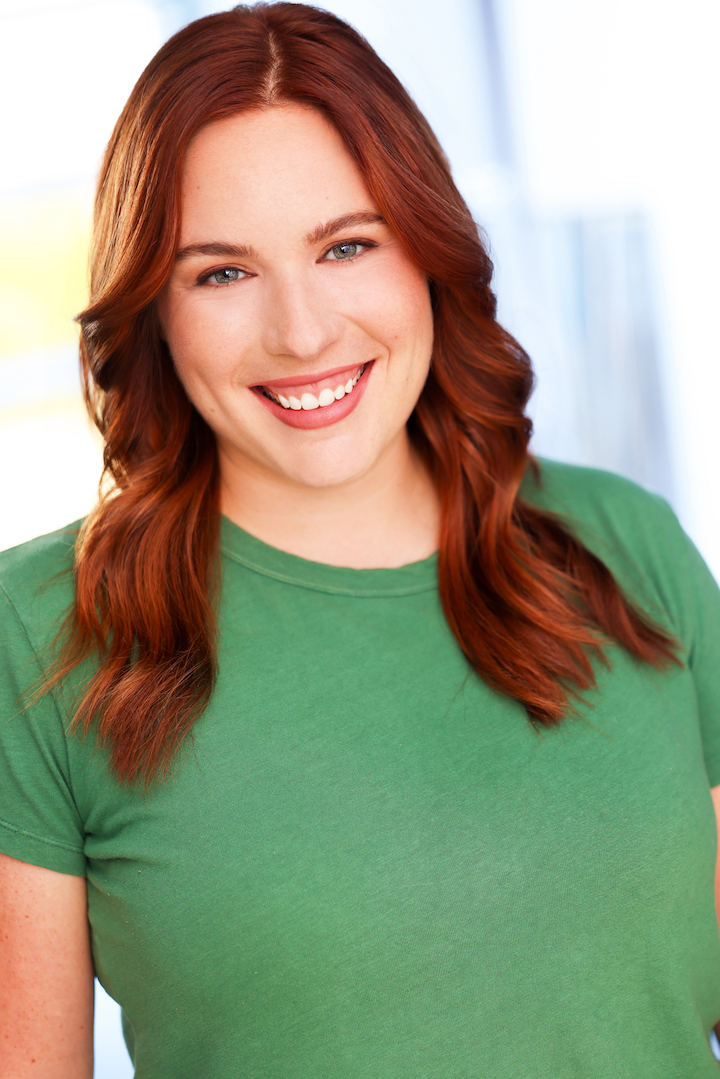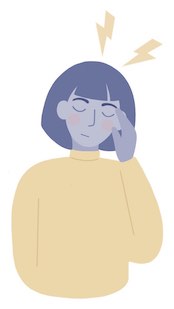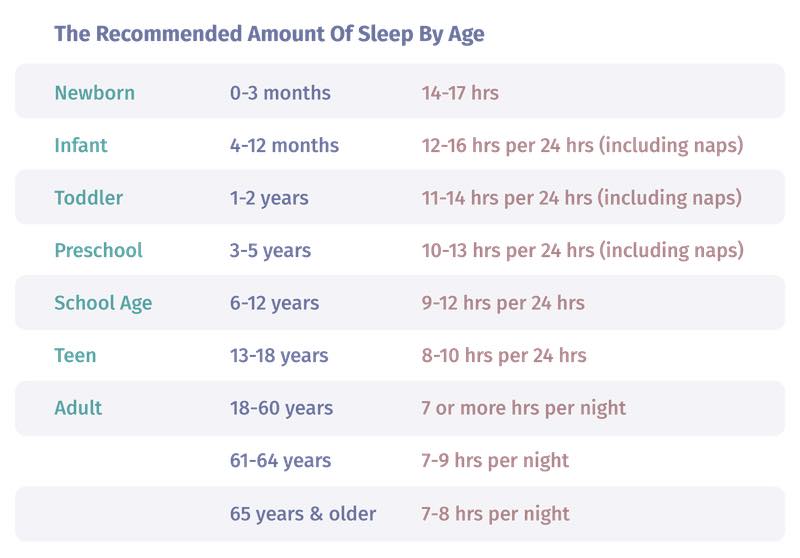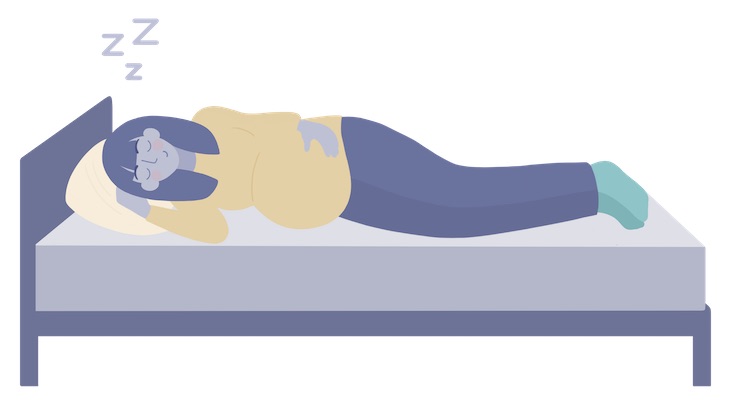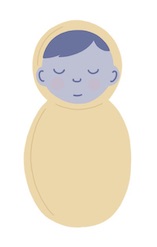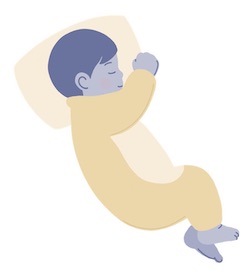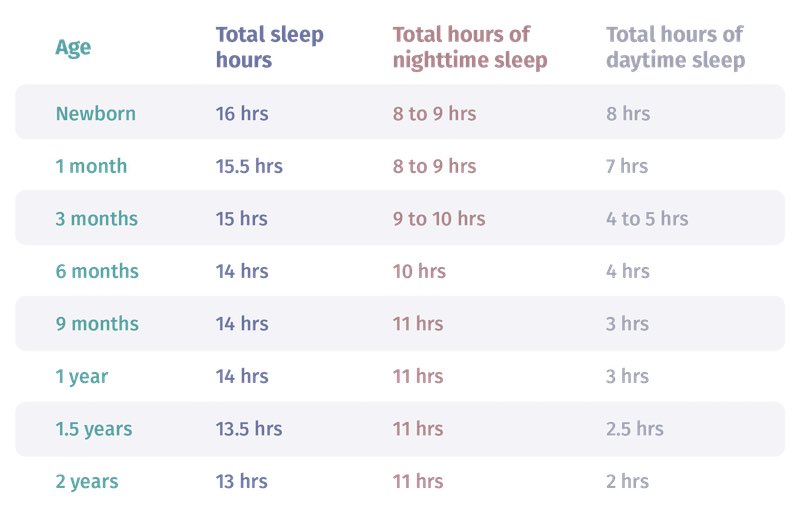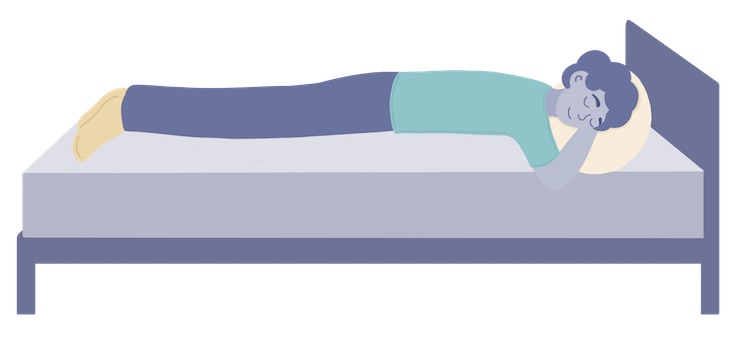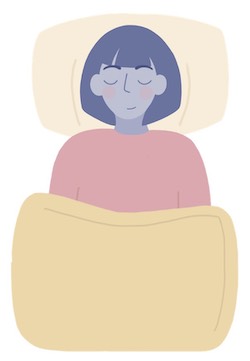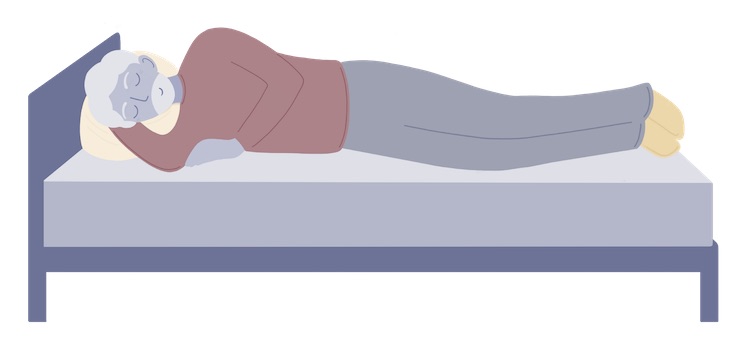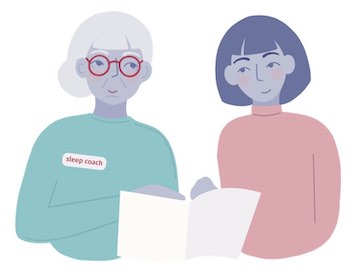Sometimes, sleep can feel like the boring option compared with everything else you’d love to fit into your day. But it’s absolutely imperative for your physical and mental health, job performance, and relationships. So how much sleep do you really need? Let’s examine the research for the full scoop.
Editor’s Note: The content provided on this site is for general informational purposes only. Any information provided is not a substitute for professional medical advice. We encourage you to consult with the appropriate health expert if you have concerns.
What Happens When You Don’t Get Enough Sleep — Or Sleep Too Much?
According to the Centers for Disease Control and Prevention (CDC), an estimated one in three Americans don’t get enough sleep on a regular basis, making them sleep deprived.
One obvious effect of sleep deprivation is feeling tired during the day. Long-term sleep deprivation has also been linked to physical conditions including diabetes, obesity and heart disease. Sleep deprivation can also affect your memory, impair your attention span, deplete your sex drive, put you at a higher risk for driving accidents and workplace errors, contribute to depression, affect your skin, and make you more prone to poor judgment.
On the other hand, sleeping too much may be linked to health risks as well.
In one study, which was published in European Heart Journal in December 2018, a research team from McMaster University in Canada surveyed the sleep habits of over 116,000 people between the ages of 35 and 70 who were living in 21 different countries. They then analyzed participants’ risk of dying or developing cardiovascular disease over almost eight years. Over that time period, 4,381 study participants died and 4,365 experienced a major cardiovascular event like a heart attack. Here’s a more detailed breakdown:
- For participants who slept 6 to 8 hours each night, 7.8 out of 1,000 experienced a major cardiovascular event or died during the course of the study.
- This number rose to 8.4 out of 1,000 for people sleeping 8 to 9 hours a night, 10.4 out of 1,000 for people sleeping 9 to 10 hours a night.
- 14.8 out of 1,000 for people sleeping more than ten hours a night.
- People who didn’t get enough sleep were affected, too — of those getting less than 6 hours a night, 9.4 out of 1,000 participants experienced a major cardiovascular event or died.
To be clear, the study is only observational, which means the researchers don’t know exactly what the link is between sleep and cardiac risks. More research is needed to fully understand this link and what we can take away from it.
The Recommended Amount Of Sleep By Age
People of different ages and life stages need different amounts of sleep. Even as an adult, you may find that your sleep requirements change with time—for example, you may need much more sleep than usual if you are pregnant, sick, or recovering from jetlag. Or, you might sleep more on vacation than you usually do at home. How much sleep you need is very personal, and it depends on your schedule, health, and more.
“Ultimately, I’m a big proponent of telling people they should go with how they feel, or notice about their ability to perform certain tasks,” James Cobb, RN, MSN, an emergency room nurse, founder of The Dream Recovery System, and member of the Mattress Clarity Expert Network, told us via email. “If they’re having trouble learning something, recovering from an injury or illness or being unreasonably emotional, the core reason is often because they’re not getting enough sleep. If you notice these things about yourself and you’re not meeting the guidelines that are listed, you probably have the source of your problem right there. Enough sleep helps you be your best self. It’s also true some people need less than that amount, though they’re the exception rather than the rule.”
That said, here are some general guidelines for the recommended amount of sleep at different life stages.
Pregnant Women
Every pregnancy is different, meaning there’s no one-size-fits-all recommendation for sleep during pregnancy. What is universally true is that sleep is important.
A study from 2011 explained that “pregnant women particularly need sufficient sleep to nourish the development of their infants and the energy they need for the labor and delivery process” (1). The study went on to say that sleep deprivation during pregnancy could contribute to higher rates of cesarean births, preterm labor and possibly higher perceptions of pain during labor.Some pregnant women may experience daytime and evening fatigue and an increased need for sleep, especially during the first trimester. According to Family Doctor, some reasons for heightened sleepiness during pregnancy include:
- Hormone changes, specifically extra progesterone, which can make you more sleepy
- Lowered blood pressure, which contributes to tiredness
- Lowered blood sugar, which can also make you feel sleepy
Some general guidelines for sleep during pregnancy: According to the National Institute of Neurological Disorders and Stroke, adults between 18 and 64 should get 7 to 9 hours of sleep nightly. And women who are pregnant may need additional sleep at night, or daytime naps, depending on their energy levels.
Newborns
According to the parenting website What To Expect, newborns up to three months old need 14 to 17 hours of sleep daily. However, most newborns need to be fed every two to five hours, meaning they sleep in short stretches — causing major sleep deprivation for their parents. WebMD estimates that newborns need to eat 8 to 12 times a day during the first four weeks, and 7 to 9 times a day from four to eight weeks old.
When newborns are asleep, What To Expect says it’s normal for their sleep to appear quite restless. “Young babies squirm around and actually wake up…a lot,” the site explains. “That’s because around half of their sleep time is spent in REM (rapid eye movement) mode — that light, active sleep during which babies move, dream and maybe wake with a whimper.”
Infants
A baby aged four to 12 months will typically sleep for 12 to 16 hours daily, which includes naps. According to Stanford Children’s Health, “Most babies do not begin sleeping through the night (six to eight hours) without waking until about 3 months of age, or until they weigh 12 to 13 pounds. About two-thirds of babies are able to sleep through the night on a regular basis by the age of 6 months.”
Stanford Children’s Health provides the following guidelines about what to expect from infant sleep by age:
Also, infants and some toddlers may experience sleep regression — when they start waking up in the middle of the night after previously sleeping well. “This typically happens at about 6 months of age,” Stanford Children’s Health explains. “This is often a normal part of development called separation anxiety, when a baby does not understand that separations are temporary. Babies may also begin to have difficulty going to sleep because of separation anxiety, overstimulation or overtiredness.” Most infants will grow out of this, but you can talk to your pediatrician or a sleep coach about tips to help overcome the sleep regression.
Teenagers
According to Nationwide Children’s Hospital, most teens only get between 7 and 7.25 hours of sleep each night, rather than the 8 to 10 hours they really need. One major cause of sleep deprivation in teens is a shift in their circadian rhythms. After puberty, the hospital site explains, teenagers’ internal clocks shift backward by about two hours. This means they struggle to fall asleep at their previous bedtime of 9 or 10 for example, and will instead not fall asleep until 11 or 12.
Another major issue facing teens is early school start times. The CDC reports that 93 percent of high schools and 83 percent of middle schools in the U.S. start before 8:30 am, meaning students must get up early to be at school on time. This is particularly grueling for students who have long commutes to school, for example, in rural areas or sparsely populated parts of the country. Back in 2014, the American Academy of Pediatrics recommended that middle and high schools in most U.S. districts should start no earlier than 8:30 am. “A substantial body of research has now demonstrated that delaying school start times is an effective countermeasure to chronic sleep loss and has a wide range of potential benefits to students with regard to physical and mental health, safety and academic achievement,” a press release explained. Research shows that delaying school start times can improve students’ wellbeing and lead to better academic performance.
Other issues that can contribute to sleep deprivation in teenagers: Overscheduling with schoolwork, athletics, extracurriculars, jobs and social functions or staying up late on devices like smartphones, tablets or laptops.
No matter the cause, teens who are chronically sleep deprived may be at a higher risk for a host of issues. “Sleep deprivation increases the likelihood teens will suffer myriad negative consequences, including an inability to concentrate, poor grades, drowsy-driving incidents, anxiety, depression, thoughts of suicide and even suicide attempts,” the Stanford Medicine News Center reports.
College Students
The Centers for Disease Control and Prevention recommends that young adults sleep seven or more hours at night. Getting enough sleep in college is important for academic success, athletic performance and good physical and mental health. But according to the University of Georgia Health Center, college students get an average of only 6 to 6.9 hours of sleep each night. Like teenagers, college students have to contend with heavy academic workloads, coupled with extracurriculars and social lives. Plus, sleeping on a college campus can be tough if you have to navigate roommate schedules, noisy neighbors and pulling all-nighters in the library.
Seniors
Your sleep habits change as you get older, which can be confusing — for instance, people who used to be night owls might find themselves falling asleep earlier and earlier each evening. But as a general rule, seniors — meaning adults over 65 — should aim to get at least 7 hours of sleep per night.
“Older adults need about the same amount of sleep as younger adults,” the Mayo Clinic explains. “As you get older, however, your sleeping patterns might change. Older adults tend to sleep more lightly and for shorter time spans than do younger adults.”
RELATED: Best Mattresses For Seniors
Seniors may also have trouble falling asleep at night. According to the American Academy of Sleep Medicine (AASM), “A study of adults over 65 found that 13 percent of men and 36 percent of women take more than 30 minutes to fall asleep.” Finally, the AASM says, seniors may find themselves falling asleep earlier than they used to, and waking up much earlier as well. The AASM says this might be due to changes in how seniors produce melatonin.
How To Tell If You’re Getting (Or Not Getting) Enough Sleep
Okay, so you’re clear on the importance of getting enough sleep. But how can you actually tell if you’re sleeping enough, or if you’re sleep deprived? Turns out, there are a number of physical, mental and behavioral signs that you are chronically sleep deprived.
“One of the main ways people can tell they’re not getting enough sleep is if they keep dozing off when they don’t want to,” Cobb told us. “This can be of small consequence when it’s in a chair in front of the TV. It can have serious or even deadly consequences when it’s behind the wheel of a car.”
According to Medical News Today and the AASM, other common signs of sleep deprivation include:
- Yawning
- Restlessness
- Feeling moody
- Longer reaction times
- Decreased vigilance or alertness
- Anxiety
- Increased errors
- Feeling excessively tired
- Irritability
- Feeling depressed
- Increased clumsiness
- Lack of motivation
- Increased appetite, particularly carb cravings
- Forgetfulness
- Trouble learning new concepts
Ways To Keep Track Of Your Sleep
Keeping track of your sleep can help you figure out how much sleep you are getting.
The only truly accurate way to measure sleep is by undergoing a polysomnogram (sleep study) in a specialized sleep lab. But if you aren’t trying to figure out if you have a sleep disorder and just want a general idea of your sleep time, at-home options might be helpful.
Collecting your sleep data over time and comparing it to other factors — such as your mood, energy levels, appetite and concentration — can help you figure out what your optimal sleep schedule looks like. Below, we’ve included a list of some of the most common options for tracking sleep at home.
Wearable Devices
If you have a smartwatch, chances are it can track your sleep for you using your movement, heart rate or even temperature. However, these records are not necessarily accurate.
Back in May, the American Academy of Sleep Medicine released a statement about wearables in the Journal of Clinical Sleep Medicine. The gist: Because consumer wearables aren’t regulated by the FDA or any medical governing bodies, any data users collect about their sleep “should be considered in the context of a comprehensive sleep evaluation and should not replace validated diagnostic testing.”
Phone Apps
Some phone apps are designed to track your sleep based on how much you move throughout the night. And some apps, like SleepCycle, will use information about your sleep stage to guide you to wake up at an appropriate time.
However, like wearables, these apps are no replacement for real sleep lab data. And you need to have the smartphone in your bed for these apps to work, which can be disruptive if you receive messages throughout the night.
Smart Technology In Beds Or Bedding
Items such as the Zeeq Smart Pillow or SleepScore Max don’t require wearing a wristband or sleeping with your smart phone in your bed. Instead, they’re built into your bedding or standalone. Smart bed technology is still developing, but some people say these products help them get a sense of how much sleep they’re getting.
Old Fashioned Pen And Paper
You can also keep a sleep diary, either by making notes on your phone or the old-fashioned way, using a pen and paper. Simply keeping note of when you go to sleep, when you wake up and how you feel — plus anything notable that happened during the night, such as experiencing a nightmare or getting up to go to the bathroom — can give you a decently solid idea of how your sleep habits correspond with your mood.
What is Keeping People Awake?
There is no one singular reason why people are failing to get enough sleep. Some individuals may have undiagnosed sleep disorders that are keeping them awake. Other than sleep disorders, medical conditions such as restless leg syndrome and gastroesophageal reflux disease (GERD) can interfere with your ability to fall asleep. Additionally, some medications can cause sleep disruptions as an unwanted side effect.
Other reasons include dealing with long and stressful days at work. This can lead to anxiety about the next day as some lay awake in bed at night. Long days at work and busy schedules also keep people from sleeping enough hours of the day. In order to keep up with a busy schedule, some opt for drinking coffee or energy drinks which can further disrupt your sleep schedule.
Research suggests that increased exposure to light, either from external sources or time spent on our phones and TV in bed, can contribute to a lack of sleep. Exposure to noise pollution is another common sleep disruption, especially for those who live in urban areas. Finally, it’s possible that sleeping on an uncomfortable mattress or bedding could be the reason you aren’t getting enough restful sleep.
Who Can Help Me Sleep Better?
If you are struggling to fall asleep at night, wake up often throughout the night, or find yourself feeling excessively sleepy during the day, then chances are, there’s something going on with your sleep. While there are definitely lifestyle changes you can make to improve your sleep, sometimes you might need input from an expert to help figure out what’s going on and get you on track to improve your sleep health.
Doctors
If you think you have a sleep disorder such as sleep apnea, which causes you to stop breathing for short periods when you are asleep, consult your doctor and see if they recommend seeing a sleep specialist. A physician can administer a sleep study, where you sleep in a lab overnight and they gather as much data as possible about your sleep.
According to WebMD, a polysomnogram can involve the following equipment and tests:
- An EEG (electroencephalogram), which measures and records your brain waves
- An EMG (electromyogram), which records muscle activity. According to WebMD, it helps determine whether you are in REM sleep or not
- An EOG (electro-oculogram) to track your eye movements, which can help the experts figure out what sleep stage you are in
- An EKG (electrocardiogram) to record your heart rate and the rhythm of your heart
- A nasal airflow sensor, which will track airflow and breathing
- A microphone to capture snoring
Psychiatrist/Psychologist
Some sleep issues are tied to mental health, including insomnia. If you find yourself lying awake at night due to stress or anxiety, consider consulting a mental health professional. A psychiatrist, licensed therapist, or counselor all have different qualifications to aid people with mental health and support services.
They can provide you with tools or habit suggestions to manage your worries via therapy or perhaps medication. Different therapy approaches also offer relaxation techniques and exercises to manage stress in a healthy way that does not impact your sleep quality.
Sleep Coach
Ever heard of a sleep coach? Yes, that’s a real thing. A sleep coach is a consultant who can help evaluate your lifestyle habits. However, they are typically not medical professionals. Depending on where you live and your health insurance plan, the cost of a sleep coach could be covered by your health insurance just like any other specialty referral. If you are having sleep trouble, it’s worth consulting a medical professional before turning to a sleep coach.
There are also Pediatric Sleep Consultants out there. Some of them are trained medical professionals or child behaviorists who can help infants, babies, toddlers and kids get into healthy sleep and nap schedules. Pediatric sleep consultants can help address problems such as waking up too early, napping erratically or not at all, transitioning from a crib to a bed, waking up in the middle of the night and more. Always bring up health and sleep concerns to your pediatrician first, and check a consultant’s credentials if you choose to go that route.
Tips for Making Your Bedroom A “Sleep Haven”
Sleep experts say that following good “sleep hygiene” rules can help you enjoy consistent, high-quality sleep. Basically, sleep hygiene represents a set of sleep-promoting habits that you can adopt. Here are some recommendations to turn your bedroom into a “sleep haven”:
Have a Nightly Routine
In order to get the amount of sleep you need, having a nightly bedtime routine can make it easier to fall asleep at a consistent time. First, you want to set a bedtime that ensures you get enough sleep at night and will wake up in time for any responsibilities you have in the morning.
Then plan for carrying out habits that soothe your mind and body an hour or two before your bedtime. What you do to wind down after a long day is up to personal preferences. You could try taking a hot bath or shower, meditating, listening to calming music, or changing into comfy pajamas to make yourself ready for bed.
Choose A Comfortable Mattress
It can be almost impossible to get good sleep on a bad mattress. Make sure you are sleeping on a comfortable mattress that is also supportive enough to keep your spine in proper alignment. If you consistently wake up with muscle aches and pains, sore joints, or back pain, you may need to replace your mattress.
If your mattress is more than seven years old,no longer supports your body, or it’s too hard and putting too much pressure on your joints, it’s time for it to go. Our team has reviewed tons of mattresses to compile a list of the best mattresses to help you start to get a better night’s sleep. Be sure to pair a comfortable mattress with comfortable sheets and a supportive pillow.
Set the Ideal Atmosphere
Light
Light is the biggest external factor in regulating your body’s circadian rhythm. Keeping your bedroom dark signals to your brain that it’s time to go to sleep. If you’re having trouble making your room as dark as possible, try wearing an eye mask to bed.
Temperature
Temperatures that are too hot or too cold can affect your sleep. Figure out what a comfortable temperature is for you and use a fan, open window, or thermostat to get there.
Noise
Many people prefer to sleep in dead silence, but this isn’t possible for everyone. Earplugs and white noise machines are effective at masking distracting environmental noises. If you don’t prefer to sleep in silence, listening to a guided meditation or sleep podcast can help you relax or soothe racing thoughts.
Limit Your Exposure to Stimulants
There are a few things to avoid before bed that could keep you from getting enough sleep. Stay away from stimulating food and drinks or products for a few hours before bed so you can fall asleep easily.
For instance, refrain from drinking caffeinated beverages in the afternoon or evening, otherwise you could be staying up past your bedtime. Blue light from electronic devices and smartphones also keeps your brain stimulated and prevents your body from releasing melatonin, the sleep-wake cycle hormone.
So, How Much Sleep Do I Really Need?
So, let’s recap. Ultimately, the amount of sleep you need depends on a variety of factors including your age, the demands of your daily schedule, and any health issues you may be dealing with.
Signs that you aren’t getting enough sleep include constant yawning, feeling sleepy during the day, struggling to concentrate, feeling irritable or experiencing mood swings, and feeling unmotivated.
There are a wide range of reasons why people aren’t getting enough sleep including health, lifestyle, and environmental factors.
If you are concerned you’re not sleeping enough, you can try making some lifestyle changes conducive to good sleep, such as making your bedroom into a sleep haven and practicing good sleep hygiene. If that doesn’t work, consult a medical professional to ensure you’re getting enough sleep on a regular basis.
[Editor’s Note: The content provided on this site is for general informational purposes only. Any information provided is not a substitute for professional medical advice. We encourage you to consult with the appropriate health expert if you have concerns.]
Additional Resources
- How Much Sleep Do I Need? — CDC
- Tips For Better Sleep — CDC
- Do Sleep Trackers Really Work? — Johns Hopkins Medicine
Featured image: A. and I. Kruk/Shutterstock
References
- Chang, Jen Jen, et al. “Sleep Deprivation during Pregnancy and Maternal and Fetal Outcomes: Is There a Relationship?” Sleep Medicine Reviews, vol. 14, no. 2, 2010, pp. 107–114., doi:10.1016/j.smrv.2009.05.001.
